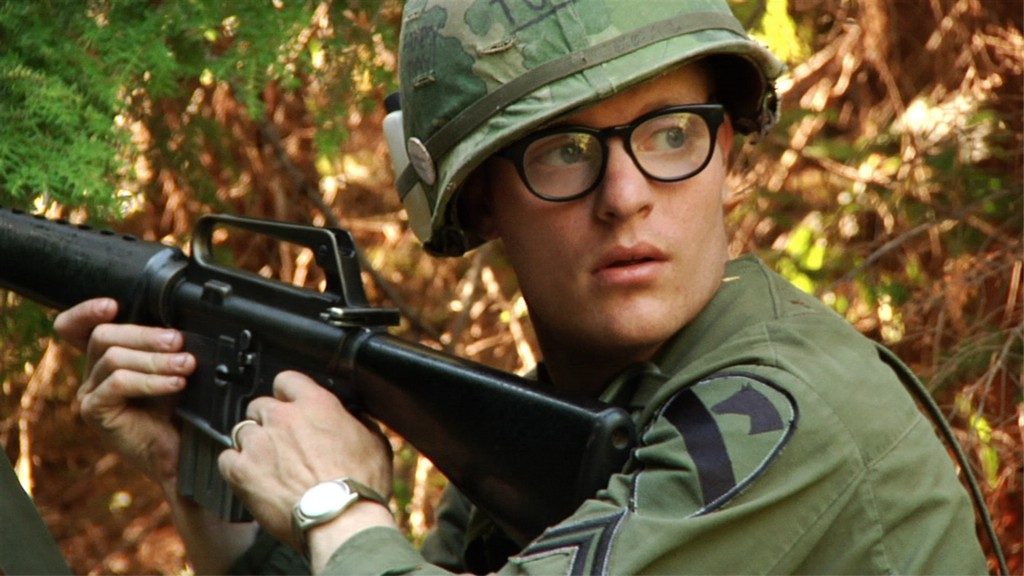Meghan O’Hara is a San Francisco-based filmmaker and educator. She is a 2014 Fellow
of the Sundance Institute Documentary Film Program and was named one of
the 10 Filmmakers to Watch in 2014 by The Independent. Her most
recent feature documentary, In Country (co-directed with Mike Attie),
about reenactments of the Vietnam War performed by veterans of Iraq and
Afghanistan, had its world premiere at the 2014 Full Frame Documentary
Film Festival and its international premiere at Hot Docs in Toronto.
In Country will play at NYC DOC on November 15 and 17.
W&H: Please give us your description of the film playing.
MO: In Country is an immersive feature documentary that follows 2/5 1st Cav
(Reenacted), a “platoon” of hardcore Vietnam War reenactors, many of
whom are combat veterans of Vietnam, Iraq, and Afghanistan. Blurring the
boundaries between reality and fantasy, past and present, In Country
tells the story of men searching for meaning by reliving the war most
Americans want to forget.
W&H: What drew you to this story?
MO: In Country felt like a perfect storm of ideas that were of interest to me. One was my ongoing fascination with the Cold War and the Vietnam Era — this was something I shared with the reenactors. Another motivation was
my growing uneasiness about my generation’s total disengagement from the
wars being fought in Iraq and Afghanistan. Much of the research for
this project involved talking to veterans about their experiences at war
and coming home. And finally, as an artist, I was interested what it
would mean to make a documentary about a fantasy world.
W&H: What was the biggest challenge in making the film?
MO: I
think we bit off a lot with In Country — an ensemble cast, fantasy and
reality, archival and verite, past and present. Negotiating all these
elements was the biggest challenge we faced. Fortunately, we were able
to work with a very talented (female!) editor, Lindsay Utz, who was
willing to dive in and wrestle with all of these complex pieces we had
been working with.
W&H: What do you want people to think about when they are leaving the theater?
MO: There
is no single takeaway that I want people to get from the film. I hope
the film moves viewers and allows them to get to know some of these
incredible people in the documentary.
W&H: What advice do you have for other female directors?
MO: Be
the director! Direct! Don’t give the reins over to someone else. I
teach film production in college and I often see young, brilliant women
hesitate to be the person in charge or to be the person shooting the
camera. Don’t work your way up. Focus on making your own work now.
W&H: What’s the biggest misconception about you and your work?
MO: Ha! I’d love to be known well enough to have misconceptions made about me! I
think when you work with documentaries, you are always fighting against
the misconception among non-filmmakers that you make some sort of dull,
eat-your-vegetables, industrial films.
W&H: How did you get your film funded?
MO: At
first, we shot the film ourselves on weekends with no budget, using a
simple kit of our own gear. We didn’t have money, but we knew as first-time filmmakers with a complex and controversial subject, we wouldn’t be
able to raise any money without footage to show. Once we had 90% of the
film shot, we launched a Kickstarter campaign to begin working with an
editor. We received some money from arts foundations in Seattle, a major
post-production grant from Modulus Studios, and in the 11th hour, we
received a post-production grant from the Sundance Institute. All along
the way, we filled in the gaps with our own savings and our own sweat.
Mike and I both worked full-time during the entire production.
W&H: Name your favorite woman-directed film and why.
MO: Barbara
Koppel (Harlan County, USA), Maya Deren (Meshes of the Afternoon), and
Carolee Schneemann (Fuses) were the first filmmakers I encountered who
made me realize women really made their own films — bold,
unapologetic, fearless films that hit me right between the eyes when I
was in college and gave me something to aspire to.







